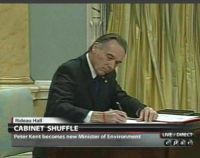Today's cabinet shuffle saw Peter Kent named as the new federal environment minister, and it couldn't have come at a better moment.
With a new year just beginning, it's the perfect opportunity for Minister Kent to chart a fresh path forward for environmental management in Canada. And, in keeping with tradition at this time of year, we've outlined a few resolutions we'd like to see the new minister adopt.
Resolution #1: Improve environmental monitoring of oilsands development and ensure existing rules are enforced
In late 2010, three independent reports — from the federal environment commissioner, the Royal Society of Canada and the federal panel struck to investigate water monitoring — all concluded there is need for much greater federal government oversight of oilsands environmental impacts.

Responding to the bleak assessment from the federal oilsands review panel last month, the Harper government committed to fix the "significant shortcomings" in the current water monitoring system.
The new environment minister must deliver on that promise with a plan to improve monitoring, and follow through on Ottawa's responsibility to enforce existing laws and regulations governing the environmental impacts of oilsands development, particularly to ensure First Nations communities are being consulted appropriately, and wildlife is adequately protected.
Resolution #2: Recognize the compelling scientific and economic reasons to take action on climate change and produce a real plan to move Canada forward
It's time to reclaim Canada's sovereignty over climate policy. The scientific argument for taking action is clear, and the economic benefits of diversifying our economy and investing in clean energy are numerous.
The Harper government has set a goal to reduce greenhouse gas pollution by 2020, but has not produced a plan to meet that goal. Right now, the policies the government has announced simply don't come close to reaching its own target.
An effective climate policy for Canada will require putting a price on greenhouse gas pollution across the economy. Instead, the federal government likes to say that it's waiting for the U.S. But now that the U.S. has started taking steps to regulate emissions from some industrial facilities, there's no sign yet that Canada is ready to follow suit.
Internationally, we're heading into an important year of climate negotiations ahead of the UN conference in Durban, South Africa, in December. Canada needs to be able to convince the world that we're doing our part, both by cutting our own pollution and by providing our fair share of the funds needed to support climate action in poorer countries.
Resolution #3: Deliver a plan to phase out coal-powered electricity generation
While Jim Prentice was environment minister, he referred to Canada as a "clean energy super power," and announced that Environment Canada would start to curb emissions from coal-fired electricity production — one of the major sources of climate change emissions and air pollution in Canada. At the time, we commended the minister for committing to reduce Canada's reliance on this dirty energy, but little progress has been announced to date to make this commitment real, and it will fall to the new environment minister to develop and implement an effective plan to get us there.
If Canada's going to live up to the "clean energy" label, it needs to do more than just start to reduce pollution from coal-fired power after 2015 (although doing this would be an important step in the right direction). The Harper government has also said that 90 per cent of Canada's electricity will be generated from zero-emitting sources by 2020. Environment Canada and Natural Resources Canada will have critical roles to play in implementing effective policies to improve Canada's performance in generating clean energy.
Time for a fresh start
Incidentally, this is also my first day on the job as the Pembina Institute's new executive director, so I can empathize with the steep learning curve Minister Kent will face in this new role. The induction of a new leader offers the opportunity for any group, be it a small organization like Pembina or a body as large as Environment Canada, to review past progress and realign its priorities for the year ahead. I'm looking forward to helping Pembina continue providing policy and technical solutions to big-ticket energy challenges, and to celebrating the success and offering constructive commentary on the performance of the new federal environment minister.
Here's to a new year, and the opportunity for a fresh start.







